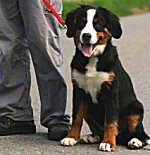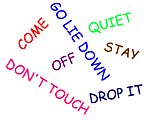Rat Terriers: What's Good About 'Em, What's Bad About 'Em
Rat Terrier temperament, personality, training, behavior, pros and cons, advice, and information, by Michele Welton, Dog Trainer, Behavioral Consultant, Author of 15 Dog Books

Both sturdy and elegant, and often described as having a dual personality, the Rat Terrier is a tenacious hunter in the field, yet a sensible companion at home.
Most Rat Terriers are athletic and agile, LOVE to play, and have a special passion for chasing balls.
Your Rat Terrier should be kept in a fenced yard or on-leash, for he is an impulsive explorer who will take off after anything that runs. He is also curious and clever at solving problems, so be sure your fences are high and secure, else he will figure out how to escape.
Rat Terriers crave lots of companionship, often using their paws to wrap around your neck or to demand attention.
Generally good with other dogs and cats in his own family, the Rat Terrier does have a high prey drive and quick reflexes. He will dispatch squeaky creatures with little effort.
Though he has a stubborn streak, he is also smart, sensitive, and attentive. He will cock his head and listen to you if you know how to be a good leader with dogs.
Being respectable terriers, Rat Terriers do love to tunnel and dig, so if you have beautiful gardens.....
Most Rat Terriers are somewhat vocal – not only barking, but also "talking" with a mumbled ra-ra-ra-ra to get your attention when they want something.
If you want a dog who...
- Comes in a range of smallish/middle sizes
- Has a sleek, easy-to-groom coat
- Is energetic and playful
- Makes a keen watchdog
- Is generally good with other dogs and cats in his own family
- Typically lives a long time
A Rat Terrier may be right for you.
If you don't want to deal with...
- The dynamic terrier temperament (see full description below)
- Providing enough exercise and activities to keep them busy
- Potential aggression toward other animals – strong chasing instincts
- Stubbornness
- Digging holes
- Barking
A Rat Terrier may not be right for you.
 |
Dog Breed Traits – Which Traits Are Right For You? In this brand new series, I'll help you decide which dog breed traits would best suit you and your family, your home and yard, and your lifestyle, so you can choose the best dog breed for your family. |
Keep in mind that the inheritance of temperament is less predictable than the inheritance of physical traits such as size or shedding. Temperament and behavior are also shaped by raising and training.
FREE eBooks by Michele Welton
![]() "Respect Training for Puppies" and "Teach Your Dog 100 English Words" are free step by step guides to teaching your pup to be calm and well-behaved.
"Respect Training for Puppies" and "Teach Your Dog 100 English Words" are free step by step guides to teaching your pup to be calm and well-behaved.
![]() "11 Things You Must Do Right To Keep Your Dog Healthy and Happy" is a free guide to keeping your dog mentally, physically, and emotionally happy and healthy so you can enjoy a longer lifetime of companionship.
"11 Things You Must Do Right To Keep Your Dog Healthy and Happy" is a free guide to keeping your dog mentally, physically, and emotionally happy and healthy so you can enjoy a longer lifetime of companionship.

- You can avoid some negative traits by choosing an ADULT dog from an animal shelter or rescue group. With an adult dog, you can easily see what you're getting, and plenty of adult Rat Terriers have already proven themselves not to have negative characteristics.
- If you want a puppy, you can avoid some negative traits by choosing the right breeder and the right puppy.
More traits and characteristics of the Rat Terrier
If I was considering a Rat Terrier, I would be most concerned about...
- The dynamic terrier temperament. Most terrier breeds are remarkably similar. The same words are used over and over – quick to bark, quick to chase, lively, bossy, feisty, scrappy, clever, independent, stubborn, persistent, impulsive, intense. But some terrier breeds are more so than others. Overall, as a breed, Rat Terriers tend to be in the lower-to-middle section of the terrier spectrum. But of course there are some individual Rat Terriers who will be in the higher end!
- Providing enough exercise and mental stimulation. I recommend that you get your Rat Terrier involved in regular obedience classes at the intermediate or advanced level, or in ongoing agility classes (an obstacle course for dogs). Or join an earth dog club, where terriers are encouraged to dig and tunnel after small critters (which are secured in a sturdy cage so they can't be harmed). There are also cool tricks and games you can teach your Rat Terrier – check out my free online training program, Teach Your Dog 100 English Words.
- Potential animal aggression. Rat Terriers are less scrappy toward other animals than many other terrier breeds. They usually live peacefully with the other pets in their own family. But they are still a determined force to reckon with if they decide to initiate or accept a challenge to fight.
- Yard security. Terriers need a fenced yard in which to stretch their legs, but many terriers are clever escape artists who will go over or under fences in search of adventure. You may need higher fences than you might imagine for their small size. You may also need to sink wire into the ground along the fence line to thwart digging.
- Running away from you. Like all dogs, Rat Terriers must be taught to come when called. But I would only count on this breed obeying his training in an enclosed area. Terriers should not be trusted off-leash. The risk is too great that they will take off after anything that runs, oblivious to your frantic shouts.
- Barking. Terriers are often too quick to sound the alarm at every new sight and sound. You have to be equally quick to stop them.
- Mind of their own. Though more amenable to training than many other terriers, Rat Terriers must be taught at an early age that they are not the rulers of the world. The toughness that makes them suited to killing vermin can frustrate you when you try to teach them anything. Terriers can be stubborn and dominant (they want to be the boss) and will make you prove that you can make them do things.
To teach your Rat Terrier to listen to you, I recommend "Respect Training." Read my free puppy training program.
- Potential defensive reactions. If you need to physically chastise a terrier, and you go beyond what THEY believe is a fair correction, terriers (as a group) are more likely than other breeds to growl or snap. As an obedience instructor, I'm always extra careful when putting my hands on a terrier for a correction.
I do not recommend terriers for small children. Many terriers will not tolerate any nonsense from little life forms whom they consider to be below themselves in importance. Many terriers are quick to react to teasing, and even to the normal clumsiness that comes with small children (accidental squeezing of their ears or stepping on their paw). Many terriers are possessive of their food and toys and will defend these from all comers, including children.
- Health problems. Chronic itchy skin allergies are the most common health problems in Rat Terriers. But epilepsy and heart disease are becoming concerns, as well.
My best-selling books – now available FREE on my website
 Respect Training For Puppies: 30 seconds to a calm, polite, well-behaved puppy is for puppies 2 to 18 months old. Your puppy will learn the 21 skills that all family dogs need to know. Click here to read for free.
Respect Training For Puppies: 30 seconds to a calm, polite, well-behaved puppy is for puppies 2 to 18 months old. Your puppy will learn the 21 skills that all family dogs need to know. Click here to read for free. Teach Your Dog 100 English Words is a unique Vocabulary and Respect Training Program that will teach your adult dog to listen to you and do what you say. Click here to read for free.
Teach Your Dog 100 English Words is a unique Vocabulary and Respect Training Program that will teach your adult dog to listen to you and do what you say. Click here to read for free. 11 Things You Must Do Right To Keep Your Dog Healthy and Happy helps your dog live a longer, healthier life. Get my honest advice about all 11 Things before you bring home your new puppy, because some mistakes with early health care cannot be undone. Click here to read for free.
11 Things You Must Do Right To Keep Your Dog Healthy and Happy helps your dog live a longer, healthier life. Get my honest advice about all 11 Things before you bring home your new puppy, because some mistakes with early health care cannot be undone. Click here to read for free.Related posts you might enjoy






